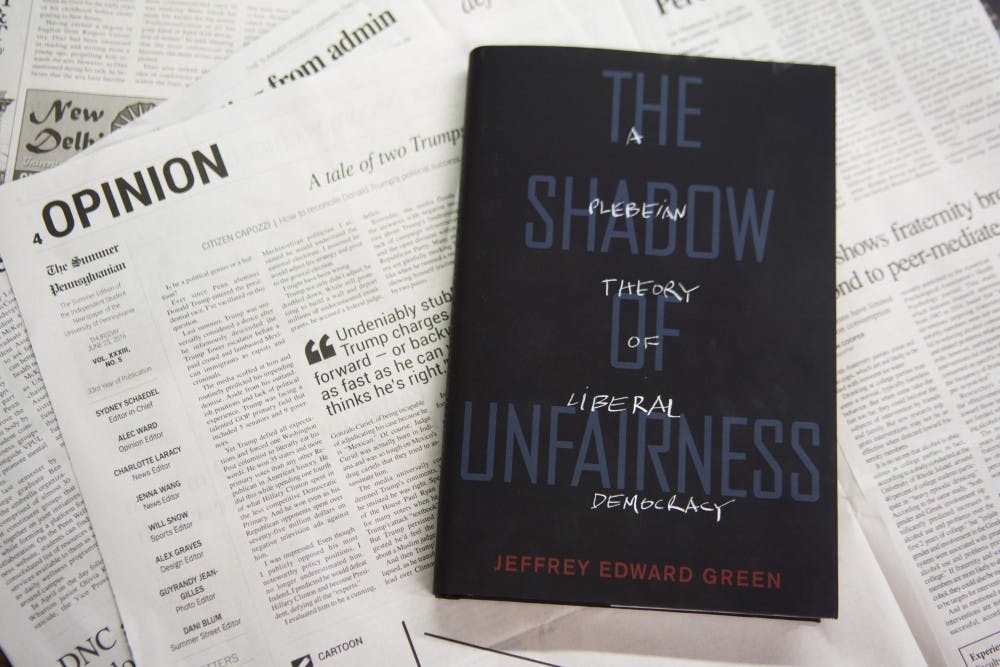
Professor Jeffery Green's new book, "The Shadow of Unfairness: A Plebeian Theory of Liberal Democracy," argues that socioeconomic status affects one's political voice
Credit: Guyrandy Jean-Gilles |Photo EditorIn the United States and every other liberal democratic regime, one can expect a degree of unfairness, according to Jeffrey Green, an associate professor of political science at Penn.
“Unfairness is when inequalities impact areas that they are not supposed to,” Green said. “How rich you are is not supposed to impact the extent of your political voice. And how rich you are is not supposed to impact the quality of your children’s education. These principles are widely held in liberal democratic culture.”
In his new book, "The Shadow of Unfairness: A Plebeian Theory of Liberal Democracy," Green argues that plutocracy and unfairness in the political system are permanent features of any liberal democracy.
Green used an interdisciplinary approach by incorporating philosophy, history, social science and literature to study the meaning of democracy in modern societies that are impaired by socioeconomic status.
“America is clearly a society where wealth gives a disproportionate amount of political opportunities to the wealthy and gives disproportionate amount of education opportunities to the wealthy,” Green said. “However, even in countries like Denmark, Sweden, Norway, Iceland, Finland and Holland, there is unfairness, less than the United States, but it is still meaningful. I want to make the claim that we should expect unfairness to be in any liberal democratic regime.”
Using Roman plebeians as a metaphor, Green compares the ancient social group to our modern second-class citizenship.
In the 21st century, ordinary citizens who do not have huge amounts of money or power can experience the feeling of second-class citizenship. Ordinary citizens can vote or protest but to have a real power, individuals have to affix themselves to a mass of like-minded individuals, according to Green.
“There is still the reality of second class citizenship," he said. "The Roman plebeians were full members but of a separate class. They couldn’t run for high office but they were voters. In many respects, ordinary citizens who do not have huge amounts of money or who are not famous or powerful, will experience levels of second class citizenship. They do not run for high office and they would never expect to.”
The book is also an effort to spotlight present-day politics. In the 2016 U.S. presidential election, economic inequality and unfairness have been key issues in both Democratic and Republican campaigns, albeit in different ways.
“One of Bernie Sanders’ core issues of his campaign is that we should become more like the Northern European countries and become more egalitarian,” Green said. “Sanders is saying that there is unfairness in America and that we need to be more like Northern Europe, but what he doesn’t say is the fact that in countries like Denmark, they also have enduring unfairness and that the shadow of unfairness persists.”
Presumptive Republican nominee and 1968 Wharton graduate Donald Trump also addresses unfairness in political money and campaign finance in the United States.
“Donald Trump and his campaign has said the political process is colonized by money and that there is a lot of unfairness where those who are rich and connected get to have access to candidates and shape the candidates," said Green. "He has a different solution; namely by trusting someone who is so rich that he is not beholden to economic interests so citizens can expect fairer policy outcome.”
Green offers a different solution than Sanders or Trump. He argues that there is value in expecting more from the best-off in country.
“The core additional argument is that the people that have prospered the most in an unfair situation, the super rich and political leaders, they have a special obligation and a larger role in remediating the shadow of unfairness.”
The Daily Pennsylvanian is an independent, student-run newspaper. Please consider making a donation to support the coverage that shapes the University. Your generosity ensures a future of strong journalism at Penn.
DonatePlease note All comments are eligible for publication in The Daily Pennsylvanian.




